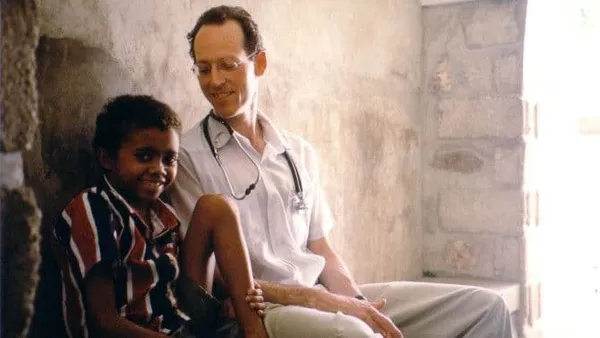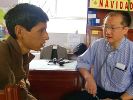Eye For Film >> Movies >> Bending The Arc (2017) Film Review
Bending The Arc
Reviewed by: Jennie Kermode

In the early Eighties, Haiti was ravaged by tuberculosis - the worst it had seen or would see until the aftermath of the devastating earthquake in 2015. At the time, many health officials felt it was untreatable. Although the disease responds well to antibiotics, they have to be taken at precise times over a prolonged period - sometimes over a year. Haitians were considered to be too irresponsible and disorganised to manage this. Nothing changed until a group of young doctors took time out from prescribing to investigate these assumptions. What they found was that the local people were struggling to stick to their treatment regimes because problems caused by poverty or the weakness caused by the disease itself made doing so impossible. By recruiting community members and training them as support workers, they turned the epidemic around. Almost all their patients were cured.
This would make fascinating material for a documentary in itself, but Kief Davidson and Pedro Kos' film goes much further, exploring how the doctors behind the successful approach went on to take it further afield. From drug-resistant tuberculosis in Peru to the AIDS crisis across Africa, the aftermath of the civil war in Rwanda and the ebola outbreak in Sierra Leone, their story is the story of a revolution in the global community's approach to tackling disease. Paul Farmer, Ophelia Dahl, Jim Yong Kim and more recall their excitement when their approach first started working, their long struggle to get their ideas heard, their amazement when global leaders started listening, and, of course, the pain of losing patients and friends along the way.

The title of the film comes from the words of Theodore Parker, popularised by Martin Luther King, "I do not pretend to understand the moral universe; the arc is a long one, my eye reaches but little ways; I cannot calculate the curve and complete the figure by the experience of sight; I can divine it by conscience. And from what I see I am sure it bends towards justice." It's pertinent not only because of the big story this film tells - the advancement of the notion that every human being has a right to basic health care - but also because this is a story whose arc can be seen only in retrospect. It's not a story of people who set out with the expectation that they could change the world, merely the story of doctors trying to do what they could to help their patients, one group at a time.
It is also a story of poor people hellping themselves. There are ironies in this which are not stressed but which are more pointed in light of attitudes to healthcare in some of the world's richer countries. It looks at the way some poorer countries chose to invest funds given to them to tackle disease in vaccination schemes instead of simply addressing crises. Others invested in infrastructure and in traning their own doctors so they didn't need to keep depending on outside help. Some donors complained about this. Perhaps charity is less attractive when it doesn't fit the saviour narrative.
There's another issue raised here which is never addressed directly yet is amply illustrated by the focus on ebola. How might that epidemic have developed if there hadn't been trained local doctors and community health workers on hand to tackle it? Looking after the health of the poorest is essential to everybody's safety. This, however, is a film focused on personal stories, so although we see the impact of the Haitian model around the world, we see it very much through the eyes of the people on the ground - generally those at the sharp end - and observe its more immediate effects. There are few more effective emotive arguments for healthcare access than the spectacular physical transformations of some of the patients; and again, an unspoken point is made, because one can see at a glance how they have moved from barely being able to care for themselves to being able to support others and play active roles in their communities.
This observational approach, given direction as much by astute editing as by the doctors' narration, ensures that the film doesn't become preachy. It invites the viewer into a world which is easy to connect with emotionally and which satisfies the intellect with its constant posing of puzzles and exploration of solutions. There is a huge amount of information contained in the film, but it never becomes dry or tiring. Nobody - even if experienced in medicine - will come away from it without having learned something.
This film's UK release, 70 years after the foundation of the NHS, coincides with the reappearance in the US of the poster child for epidemics, Y. pestis - otherwise known as plague. Health services are braced for its impact in a state from which hundreds of millions of people fly internationally every year. The healthcare available to the poorest may again become an issue of global importance - but in medicine, there is always a crisis happening somewhere. Bending The Arc shows that it's possible to make the world better.
Reviewed on: 16 Aug 2017
















